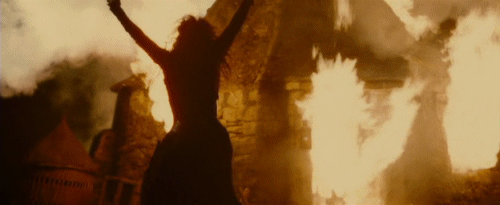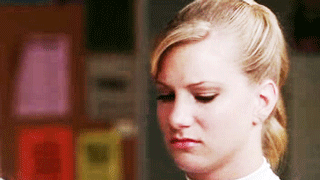SPOILERS!!!
For most people, the question that is asked at the end is "was the fantasy world real, or did Ofelia make it all up to cope with her wretched life?". Director Guillermo del Toro has personally stated that he feels the world is real, but that it is in fact up to the individual viewer.
For me, I never doubted that it was real, though I believe those who disclaim this theory can make a good case for turning the movie from a macabre adventure into a solid psychological thriller. Interestingly enough, this big "Real or No Real" question never even crossed my mind. Instead, I had more important things to think about:
What the flippin' heck is going on?
Allow me to explain. There is a particular line that stood out to me in the movie that, as far as I can tell, no one else is paying much attention to, and that is when Ofelia is talking to Mercedes while she milks. The child is asking her questions about fantasy realms, and though Mercedes insists that she no longer believes in magic, she does issue the phrase that stuck in my head:
"My mother always told me to be wary of fauns."

I assumed that this would be addressed later, but it never was, and it gave rise to my own interesting theory that I'd like to lay out for you now.
del Toro has stated that Mercedes is much like the older version of Ofelia, which means that she probably doesn't lie, and at least at some point in her life had fascination with the fantasy world. Since fauns are real, I took Mercedes' words as law: be wary of fauns.
This led to the fact that The Faun was in fact tricking Ofelia somehow. Well, throughout the movie we learn that he is testing her, yes, but that is not the same thing as tricking her. I felt that there was something here that I was missing, and that it was focused primarily on Ofelia AND the Spirit of the Princess Moanna that she is said to possess.
I decided that, throughout the entire movie, there is a war happening in Spain between the losing rebels and the "obedient" El Capitan and his men. Just so, I felt that there was a war happening in Ofelia between the girl herself and the Princess' spirit. We see that she is often torn between staying with her mother and visiting the fantasy world. So I am now going to refer to "Ofelia" as her human side, and "Moanna" as her fantastical, other-worldly side.
This would explain much of Ofelia (as a character)'s strange behavior. The Ofelia side acts like a child: guilty at getting her dress dirty, resentful of a stepfather, protective of a baby brother, loving of her mother. Moanna, meanwhile, is the rebellious side; disobedient, unfazed by the obscenity of the fantasy world, and determined to return and be a true princess again. Remember, del Toro himself spoke up Ofelia's greatest virtue being that of disobedience in the movie, as contrasted to El Capitan. This is probably Moanna's side of her (remember, the Princess disobeyed and ran away into the human world in the beginning of the movie).
The girl is remarkably unafraid of the Faun.
In any case, it is clear that The Faun is desperate to have Moanna back, and I believe it is without Ofelia. And Ofelia is tied down to her mother and family, though she gets less and less so as the movie goes on, the moon grows fuller, the fantasy realm gets more real and the Moanna's side of her begins to overshadow her humanity. The three tasks that the Faun sets of Ofelia to prove that she has the Moanna's spirit do their job well, especially the third, which is what I'd like to focus on.
The Faun has tried to help Moanna (and Ofelia) complete the three tasks as quickly as possible (like giving her mother the mandrake root so that Ofelia won't have to stay and take care of her), but in the end, Ofelia has almost nothing left except her brother and Moanna. As she stumbles into the Labyrinth at the end, clutching her baby brother in the childish belief that they will live together as Prince and Princess, she is stumbling into the snares of The Faun. I do not believe, really, that the Faun cares for Ofelia in any regard other than the fact that she houses the spirit of Moanna, and it is for this reason that Ofelia should have listened to Mercedes, and been wary of the keeper of the labyrinth. In the last few minutes of the movie, we come to the final task, which is the spilling of innocent blood in order to open the portal that Moanna can go back through.

I believe that the Faun lied to Ofelia her about being a princess in the fantasy world throughout the entire movie. The fantasy princess, after all, died quickly in the human world, and once the Moanna's spirit left her, Ofelia might have been as oblivious to the magical realm as the other human characters. The Faun says later that it was a test, and a happy Ofelia bounces joyfully off into the Fantasy World as Princess. But that didn't sit right with me.
Let's pretend for a moment that Ofelia had agreed to sacrifice her brother. She would have failed the test, dirtied her purity and proven that she did not possess the spirit of Moanna, and would not have been allowed to enter the fantasy world. BUT we know that since she didn't, there still had to be a sacrifice, and there was no other viable option save for Ofelia herself. There was no possible way that Ofelia entered that world, but there was a viable way that Moanna did, and that was through Ofelia's death, and Ofelia's only. I believe, yes, that Moanna went off into the kingdom where she belonged. But I also know that Ofelia's body didn't go anywhere. She lay, dead, at the edge of the portal, killed by her stepfather and sacrificed by the cunning faun and desperate Moanna. The obedient side, just like in the real battles of the movie, was defeated by the rebellious one. And yet, I am happy for Ofelia. She passed the test as much as Moanna by doing the right thing, saving her brother and keeping her blood pure so that Moanna might find her way home again.
So to sum it up, no, I don't think that Ofelia went to the fantasy world at the end. But I do think that Moanna did, and I think that the last scene, like the character Ofelia, is a combination of the two of them. It is Moanna coming home to her kingdom, but it is also Ofelia entering heaven and seeing her mother and father again.



